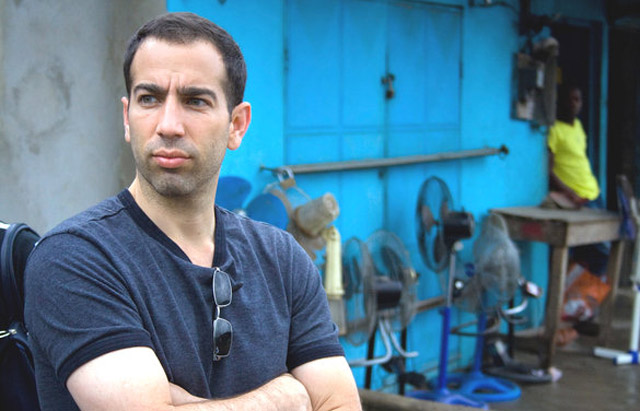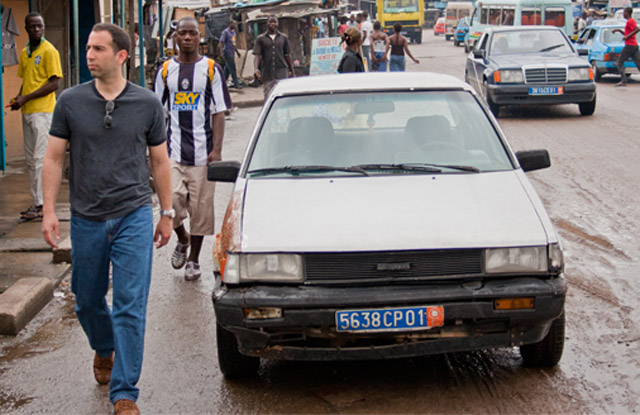CHICAGO – Patrick McDonald of HollywoodChicago.com appears on “The Morning Mess” with Dan Baker on WBGR-FM (Monroe, Wisconsin) on March 21st, 2024, reviewing the new streaming series “Manhunt” – based on the bestseller by James L. Swanson – currently streaming on Apple TV+.
Interview: Documentary Maker Ami Horowitz Takes on ‘U.N. Me’
CHICAGO – “U.N. Me,” a risky and provocative documentary, is taking the United Nations to task for what they have become – an institution more interested in keeping the bureaucratic status quo than going forward with their original charter. Filmmaker Ami Horowitz, along with his co-writer and co-director Matthew Groff, pull no punches in their cinematic investigation.
Ami Horowitz is the on-screen guide through the film’s thesis, and uses humor, creative graphics and satire to enhance his point. His passion is apparent in every frame, up to and including the moment in the film in which he steps up to the U.N. podium – while on a tour – and makes his own impassioned speech. HollywoodChicago.com got to talk to Horowitz about his film, and the conversation matched the enthusiasm displayed in “U.N. Me.”
 Photo credit: Visio Entertainment |
HollywoodChicago.com: What is the main takeaway you want for the audience regarding your documentary ‘U.N. Me’?
Ami Horowitz: The main takeaway is we deserve better as humanity than what we have in the U.N. It seems to me that the world has progressed and gotten better in more ways than could be imagined – women’s rights, gay rights, access to water and food, hunger issues – we’ve made massive strides in many ways as a species. The one place we haven’t, actually regressing, is in security.
The whole reason I came up with this movie is that I was watching ‘Bowling for Columbine’ and thinking about the United Nations, in the context of Rwanda. I thought, this is a f**king genocide in our lifetime. And then I thought, Rwanda? The Sudan genocide is happening right now. As I’m sitting in my upper West Side apartment, comfortable, there are people running in terror. I really got upset, and I thought we deserved something better.
HollywoodChicago.com: Why does the media, and I’m generalizing, keep news of the United Nations out of the information mix?
Horowitz: The media does talk about these issues, they talk about the Sudan, they talk about Iran possibly having nuclear weapons, they talk about terrorism, but they fail to tie it into the U.N., they fail to make that connection. I’m trying to talk about the U.N. in association with those issues, and at best the media are asleep at the switch, and in some cases they are abetting it.
HollywoodChicago.com: Why do you think the U.N. has been able to keep it’s somewhat passive and peaceful image, despite – as shown in your movie – their negative actions and rudderless leadership?
Horowitz: Depends on who you’re asking that question to. If you’re asking a European, I think it’s an appropriate question, if you’re asking a rightwing Republican, they don’t have the same point of view. I think with most Americans, left and center, the view regarding the U.N. is changing. I’ve been working with Congress, there is a lot more traction with the Democrats regarding U.N. policy than there has ever been before. They are tired of funding it to the tune of almost 10 billion dollars a year, they are tired of them going against our interests. Something has changed significantly in the past 5-7 years.
I’m a conservative, most of the people who worked on the film are liberals. One of the more interesting processes regarding the film was seeing liberal film editors and cinematographers seeing and filming what we collected and having their heads blown apart by it. They couldn’t believe what some people said, and what we were putting together. It’s not that they were pro-U.N., they just didn’t think about it. When we do test screenings to a mixed political audience, the left are often more outraged than the right.
HollywoodChicago.com: We heard the catchphrase and title ‘U.N. weapons inspectors’ virtually every day during the run-up to the Iraq War. Given your film’s thesis, was this mission as feckless – in your opinion – as some of the others shown in your documentary?
Horowitz: I think the answer is yes. Because how are you going to take what they say at face value? I think their missions are failures from the beginning, because of the way their mandates are set up. You can only go to places where they would allow them to go check. The information was faulty just because the inspectors didn’t have the resources or the mandate to uncover anything. That’s a big problem. They’re going down the same path in Iran, but this time that country is getting weapons, unless we can stop them.
HollywoodChicago.com: The United Nations jumped on anti-terrorism post 9/11, as depicted in your film. Since this is shown to be somewhat of an empty pursuit, did they do it only to justify their existence?
Horowitz: I don’t know the answer, but I will say this. There was empathy from some parts of the U.N., because they are in New York City. The U.N. is split between the bureaucrats, who are normal people with a perverse view of the world, and the other half is really bad people, who have dark motives. The ones who are the bureaucrats felt it was terrible and really wanted to do something. When you’re talking to them, you feel like a million bucks, because in talking to them they always have solutions. Peacekeeping rapes? Zero tolerance. But nothing got changed.
 Photo credit: Visio Entertainment |
HollywoodChicago.com: The budget of the U.N., given to them by the United States, is between eight and ten billion dollars. What percentage of that figure do you think is purely bureaucratic, versus peacekeeping, versus humanitarian efforts?
Horowitz: It’s impossible to say, and the U.N. certainly doesn’t give out that information. You’d think they would, it is our money, but it’s a very opaque institution. There is no way to know exactly. I will say they fly first class, and they stay at the top hotels.
Here is a statistic that I know. Because of the fraud in peacekeeping, they hired an American forensics accounting team to find out how the money is spent. They went back a few years, looked over every purchase order and took an inventory. They came back and reported that 25% of everything that is spent is fraud. Not waste, but outright fraud. The U.N. said wow, fascinating, you’re fired.
HollywoodChicago.com: What can the U.N. do to improve? What can the institute do to make itself more relevant, since you’ve done all this research. What three specific things would you change right now?
Horowitz: Number one, reform the U.N. Human Rights Council. If you’re going to have human rights abusers leading that charge, it’s never going to work. Number two, expel some countries. The U.N. charter is very clear. If you do not abide by the values, and the values are set up, you don’t deserve to be a member. A lot of smaller rogue countries derive their power from the U.N. Take that away, and you’ll see some change. And number three, you have to be transparent about the spending. Whenever you have a combination of a super big government entity like the U.N., and you couple that with opaqueness and secrecy, that’s when all the fraud happens. Nothing cleanses more like sunshine.
HollywoodChicago.com: Both the Wall Street bankers and the U.N. have something in common, they never seem to be brought to justice for their actions. How does that pervert our system of law, order and justice in our so-called system?
Horowitz: It is a problem. If there is no accountability, if you are not brought to account for misdeeds, then you are enabled to do it again.
HollywoodChicago.com: Well, if human beings are put into a no-accountability situation, that everyone involved will not be accountable?
Horowitz: Yes, I think that is a human condition.
HollywoodChicago.com: In looking at the history of the United Nations, we see the origins out of World War II and nations coming together to achieve peace. And here we are 60 years later with the exposé that is your film. Is there any scenario that can help the human condition without being corrupted?
Horowitz: I would like to think so, I’m a short term pessimist and a long term optimist. I like to think that we can be better. As long as we can be transparent, as long as there are procedures that bring people to account, and if you put good people into it, we can come to a better place.
 | By PATRICK McDONALD |


